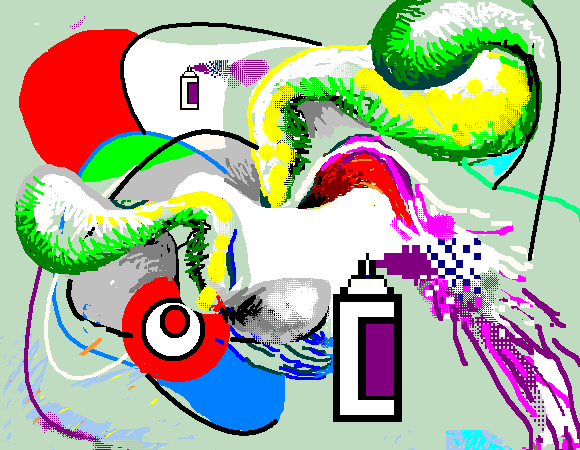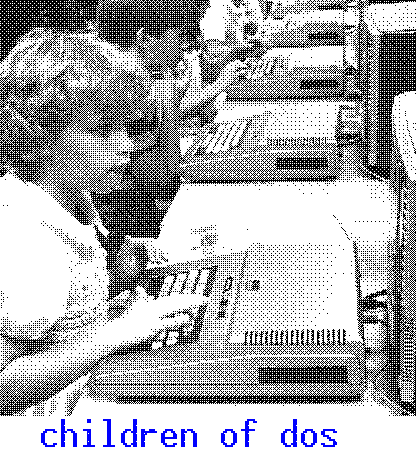View current page
...more recent posts

"Everyone Fights, No One Quits" [mp3 removed]
The beat is simple but has a strong forward drive--it's one of the first times I've actually liked the bitcrusher-type effect. The "main melody" is the Oki Computer 2, which I am finally starting to understand the guts of. It is a purely digital instrument that for its oscillator uses a up to 16 optional waveforms--as a cursor moves horizontally through them, each morphs into the sound of the one adjacent to it. Moving the slider rapidly back and forth results in interesting timbres. These are further shaped by a sequencer, envelope generators, and LFOs--all of which can also modulate the cursor position. Contrasting with the Oki in this piece are analog sounds that are heavily LFO'd and appear to wax and wane randomly.
"Rubber Elephants" [mp3 removed]
The tune started out as the Conlon Nancarrowish "Piano Three Hands," which I've been saying mainly sounds that way because of the pianos. Here I used a Moog-like synth playing the same notes as the earlier piece(s) (plus some new percussion). It's burbly and perenially slightly out of tune so I gave it a new title. It could also be Switched-On Inebriated Bach.

Image from the New York Times, during the run-up to the US invasion of Iraq.
The scenario was deeply ironic and cynical, yet average Americans took it on faith that war was necessary and being glorified. The glib news media didn't believe a word of the propaganda they dispensed, yet put the utmost creativity into fostering a sense of urgency. We could be talking about the Iraq war, but the subject is Starship Troopers, Paul Verhoeven's film of Robert Heinlein's not-so-crypto-fascist novel. It's hard not to watch it today without seeing it as a blueprint for how the New York Times, Washington Post, and the other major media sold Bush's war. Verhoeven cast attractive then-unknowns as the film's citizen soldiers and their intertwined stories completely grab you, even though the movie's oft-stated belief in force and violence as the ultimate arbiter of the greater good is dangerous malarkey. Similarly, the Times and Post played its part in stoking the masses, not just with Judith Miller's fabricated scare stories about Iraqi superweapons, but with the front page photos of soldiers hugging their loved ones as they prepared to depart for the habitat of the dangerous colonial Other. U.S. tanks and warplanes overran Iraq's borders, even though, as we all know, the country had nothing to do with the 9/11 attacks; Troopers briefly suggests, only to sneeringly dismiss it, that humans started the war by encroaching on the alien bugs' Galactic turf. Yet the Times and its ilk devoted little ink to root causes, in their bloodlust, misplaced desire for 9/11 revenge, and crass schemes to sell papers. Small surprise that Verhoeven saves one of the most gruesome deaths for an embedded reporter, whose last moments are filmed by a transfixed cameraman who doesn't put down his recording device to help.

10 Songs for Analog Drum Machine & Sidstation
(These have all been posted before, just not as a group, except briefly over on the left. I just acquired an analog synth, which will probably get its own suite, then duets with the Sidstation, etc.)
"Two Bass Salad" [mp3 removed]
"Protest Song (Human Crab Louse)" [mp3 removed]
"Suite 6" [mp3 removed]
"Protest Song Variation" [mp3 removed]
"Crickets" [mp3 removed]
"Godhopper" [mp3 removed]
"Marching Morons" [mp3 removed]
"Clip City" [mp3 removed]
"Permanent Chase" [mp3 removed]
"Slow Hooterville" [mp3 removed]
Bonus tracks with the same instrumentation:
"artMoving" [mp3 removed]
"Suite 6 (Almost Live)" [mp3 removed].

artist unknown - thanks to MBS for reminding me about that GIF scraper page for LiveJournal - there was so much good stuff I had to stop downloading so I could have a life -
"Amiable Floater" [mp3 removed]
Not that it matters, but the sound generation of this song is 100% analog. The computer was used only to trigger note on/off and velocity and to record and mix. The rest of it's voltages and filtering and a lot of layering. The genesis of it was that the drum machine I'm using has three tunable drums that can either be kicks or toms. I tuned them so the drum hits could be played like a bass line. The piece isn't really all that amiable--it gets a bit mysterious at the end during the "acid" part. The overall texture makes me think a little of Derrick May's work, which was the first techno music I really started studying. Not sure why exactly--kind of a jazzy feel?
It's a good headphone piece, I think.
